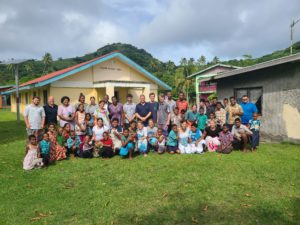Maymester Trip Full of “Wonder and Awe”
PC students and professors travelled 7,500 miles for a life-changing Maymester trip to Fiji. Ciera Carter, a rising senior double majoring in history and biology, was one student on the trip led by history professors Dr. Roy Campbell and Dr. Mike Nelson.
Here’s what Ciera says made the trip to Fiji so memorable.
Fiji Time
The phrase “Fiji time” is about the only thing that can fully encapsulate all that we experienced on our trip abroad. Learning about the history, culture, and climate issues before our adventure barely scratched the surface of the wonder and awe that struck all of us as we traveled from island to island, and it certainly was not able to fully prepare us for our “Fiji time.”
What is “Fiji Time”?
To clarify, for the sake of this trip recap, “Fiji time” refers to the more relaxed pace of life on the islands, a unit of time the native Fijians use to get tourists to stop asking how much longer the bush walk is, and as a general description of our time spent in Fiji.
Adjusting to a Different Time and Place
As the trip began, we were eased into our Fijian experience to let our bodies and minds adjust to the wildly different time zone and food. Apart from experiencing some taxi drivers that could win the Indy 500 blindfolded, we ate a beautiful sunset dinner on the water, ate coconuts at a Hindu temple, hiked through sand dunes, and explored The Garden of the Sleeping Giant. While all of that seems amazing, our adventure was just in its infancy.
Exploring the Island
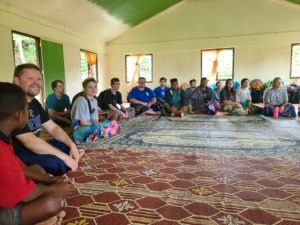 On just the second day of our stay, we were treated to an all-day boating experience that consisted of snorkeling, jumping into the bluest water you can imagine, and hiking to the peak of the mountain that co-starred with Tom Hanks in Cast Away. How many people can say they have done a backflip off a boat and hiked up the mountain on the island that Cast Away was filmed on with their professor? Probably only about three.
On just the second day of our stay, we were treated to an all-day boating experience that consisted of snorkeling, jumping into the bluest water you can imagine, and hiking to the peak of the mountain that co-starred with Tom Hanks in Cast Away. How many people can say they have done a backflip off a boat and hiked up the mountain on the island that Cast Away was filmed on with their professor? Probably only about three.
Aside from nearly having an out-of-body experience as we scaled the side of the mountain and my cardio proved to be more insufficient than I expected, we learned that Monuriki Island was owned by the grandmother of the crew member that led us to the top and that every tourist that visited the island contributed to his family. It was refreshing to know that the island remained in the hands of the native people.
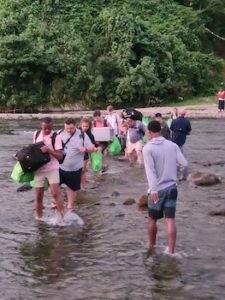 Hands-on Learning
Hands-on Learning
Our first week allowed us to strictly be tourists as we traveled from Barefoot Manta Resort to Octopus Resort. In that sense, our “Fiji time” was defined by snorkeling with manta rays, scuba diving, drinking kava, and playing volleyball in the most beautiful paradise. These resorts gave us the first taste of Fijian culture and hands-on learning as the staff welcomed us with open arms and treated us like family from the moment we stepped on their island.
For me, this became evident during our search for the manta rays in the area. I could not swim fast enough to catch up and see the manta ray that had been spotted ahead and one of the staff members noticed, grabbed me by the hand, and swam for me so that I would get a chance to see the manta.
He probably had a 130-horsepower motor strapped to his back because it seemed physically impossible for a human to swim that fast. Sure enough, I was able to watch as the baby manta ray fed below us.
An Opportunity to Learn about Ourselves
During our second week in Fiji, we escaped the comfort of the resorts and became completely immersed in the culture we had learned so much about. With that being said, most of us learned just as much about ourselves as we did about the people of Fiji.
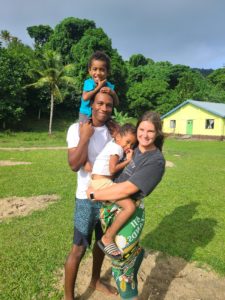
Our three-night stay at the Namosi Eco-Retreat, situated deep within the highlands of Fiji, proved to be the greatest test of mental fortitude for some. With no power or service, our days were filled with swims in the river, a 30-minute “Fiji time” bush walk that turned into almost three hours, building a bamboo raft with bamboo trees that we carried down the mountain ourselves, A LOT of volleyball, playing with kids from various villages nearby, and battling giant, softball-sized frogs that ruled the darkness.
However, despite the frogs, being forced to unplug taught us to be truly present in all of the new things we were experiencing and allowed us to fully be able to interact with and learn from the villagers. Both of which proved to be incredibly rewarding.
Real-World Research
Personally, one of my favorite experiences was swimming out and monitoring the marine conservation area that paralleled the Lawaki Beach house on Beqa Island. With the help of a local marine biologist, we were able to analyze the health of the reef by documenting coral size and bleaching and noting the diverse types of butterfly fish that swam in and around the reef.
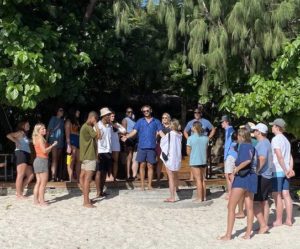 It was gratifying to be able to gather data that had real-world implications and meant a lot to the native Fijians as they heavily rely on the health of the ocean for survival.
It was gratifying to be able to gather data that had real-world implications and meant a lot to the native Fijians as they heavily rely on the health of the ocean for survival.
The Joys of Life
Finally, we were welcomed by the people of the Naiseuseu village. Our host families and the people of the village were exceedingly kind and open to sharing their lives with us. While having no power remained difficult for me at times, the sustainable way of life, island food, and the playfulness of the young children quickly became attractive.
In a way, the genuine happiness I witnessed and the slower-paced lifestyle made me hesitant to come back home. However, this experience also taught me that air conditioning and iced sweet tea are vital to my survival on this planet.
Fiji Time is Time Well Spent
I will be forever grateful to PC, Dr. Campbell, and Dr. Nelson for allowing me to go on this adventure and equally thankful to all of the people who helped us on our journey and welcomed us onto their islands and into their homes. Vinaka Vaka Levu (thank you very much), Fiji!
